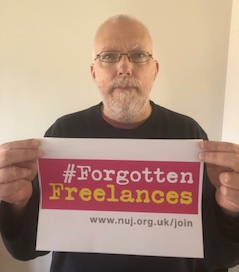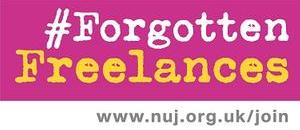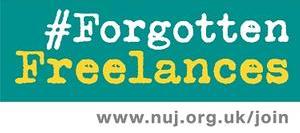#ForgottenFreelances: One third say they do not expect their income to improve until next year
As the government's financial aid package opens (May 13), many freelances have found they are not eligible.
A third of freelances do not expect their incomes to improve until next year, with 40 per cent saying it could take three to six months, while 16 per cent believe they will not be making their living from journalism after the coronavirus pandemic.
However, that means nearly 88 per cent of the more than 1,200 members who responded to a NUJ survey said they did intend to trade in 2020/2021.
Two-thirds of NUJ members said the pandemic and lockdown had affected household income to date, with 18 per cent saying they had suffered between an 80-100 per cent drop in income.
Many freelances doing shifts for newspaper, magazines and publishers are part of the PAYE system and therefore eligible to be included in the Job Retention Scheme – with the government covering 80 per cent of their wages. However, the survey revealed that 5.5 per cent of those who responded said the company they worked for had refused to do so.
Pamela Morton, freelance national organiser, said:
"The present crisis has lifted the lid on the complexity of the way people work and are paid. Our members have been pushed into working arrangements not out of choice which are now making them fall foul of the various criteria set down in the government's aid package for freelances.
"Freelances are also being treated badly by newspapers, magazines and other organisations which need them week in, week out but refuse to put them on the furlough scheme. If a company refuses to furlough you, please contact the NUJ at [email protected] so we can approach the company on your behalf."
As well as employees, the grant can be claimed for any of the following groups, if they are paid via PAYE: office holders (including company directors), salaried members of Limited Liability Partnerships (LLPs), agency workers (including those employed by umbrella companies), and Limb (b) workers, generally self-employed people who carry their work out as part of someone else's business.
Nearly 13 per cent of freelances surveyed said they were paid via PAYE and eligible to be furloughed, nearly 2 per cent were agency/umbrella company workers and 0.23 per cent Limb B workers. If you were being paid via PAYE on 19 March 2020 and were on the PAYE payroll on or before 19 March, then you should approach the company to be furloughed if they have terminated your work.
If you were working and being paid via PAYE or before 28 February 2020, but not on 19 March, the company can re-engage you and put you on furlough.
Members working in the public sector – including the BBC – are not covered by the furlough scheme, but have seen all their work cancelled for the foreseeable future.
The UK government has now confirmed that the Self-Employed Income Support Scheme (SEISS) will accept applications from May 13 and HMRC will begin contacting eligible self-employed individuals this week by email, text and letter. With reports of up to two million individuals with self-employed income not covered by the SEISS, the union is continuing to highlight those who are still receiving no support.
Another group of individuals who have also seen the almost complete loss of their work and have had little government support so far are those who work via limited companies, personal service companies and limited partnerships.
Nearly 17 per cent of respondents said they were company directors; 3 per cent said they were office holders of limited partnerships and 2 per cent were salaried members of limited partnerships. Many were forced to incorporate because they were working for companies who insisted on hiring workers via their companies and would not deal with sole traders, again not wanting the individual to acquire rights under employment legislation.
There are no longer any financial advantages to working via a limited company since total deductions are similar to those of a sole trader or a PAYE employee – they are just calculated differently. One member said:
"I converted to this because at the time we needed childcare vouchers; it was the only way to claim them as an employee. Other people I know do it because the people they work for require them to be a limited company. It was – and continues to be – an absolute nightmare in terms of accounting, and earnings are not enough to make it tax-advantageous because of the accountancy fees because you have to have audited accounts.
"I pay myself a small monthly salary and take the rest in dividends (which are taxed via corporation tax). But the only thing the Chancellor has offered people who operate through limited companies like this is 80 per cent of their salary element if they furlough themselves – which I can't live on."
It is clear that those running limited companies need a system similar to that offered to sole traders and partnerships, based on their tax returns. These show how much they received in both pay and dividends so could provide an average income for the past three years. They are the most regulated of all the self-employed, producing accounts for Companies House as well as HMRC and they are asking why they are excluded from support.
#ForgottenFreelances
If you are one of the #ForgottenFreelances who is not eligible for the SEISS scheme download this letter to help you make your case to your MP:
Your MP can also support Early Day Motion 389 tabled by Caroline Lucas MP which notes concern that the details of SEISS do not reflect the reality of self-employment in the UK.
We are also asking other members to support freelance colleagues by sending this letter to your MP, which urges the UK government to revamp its scheme to provide more support for freelances, PAYE individuals and the self-employed:
You can find your MP's email address on the WritetoThem website:
Support the NUJ's #ForgottenFreelances by tweeting a picture of yourself with the campaign logo:

Francis Sedgemore
© Private
Download the logos:
(the thumbnails link to larger versions of the images)

© red engine

© red engine
